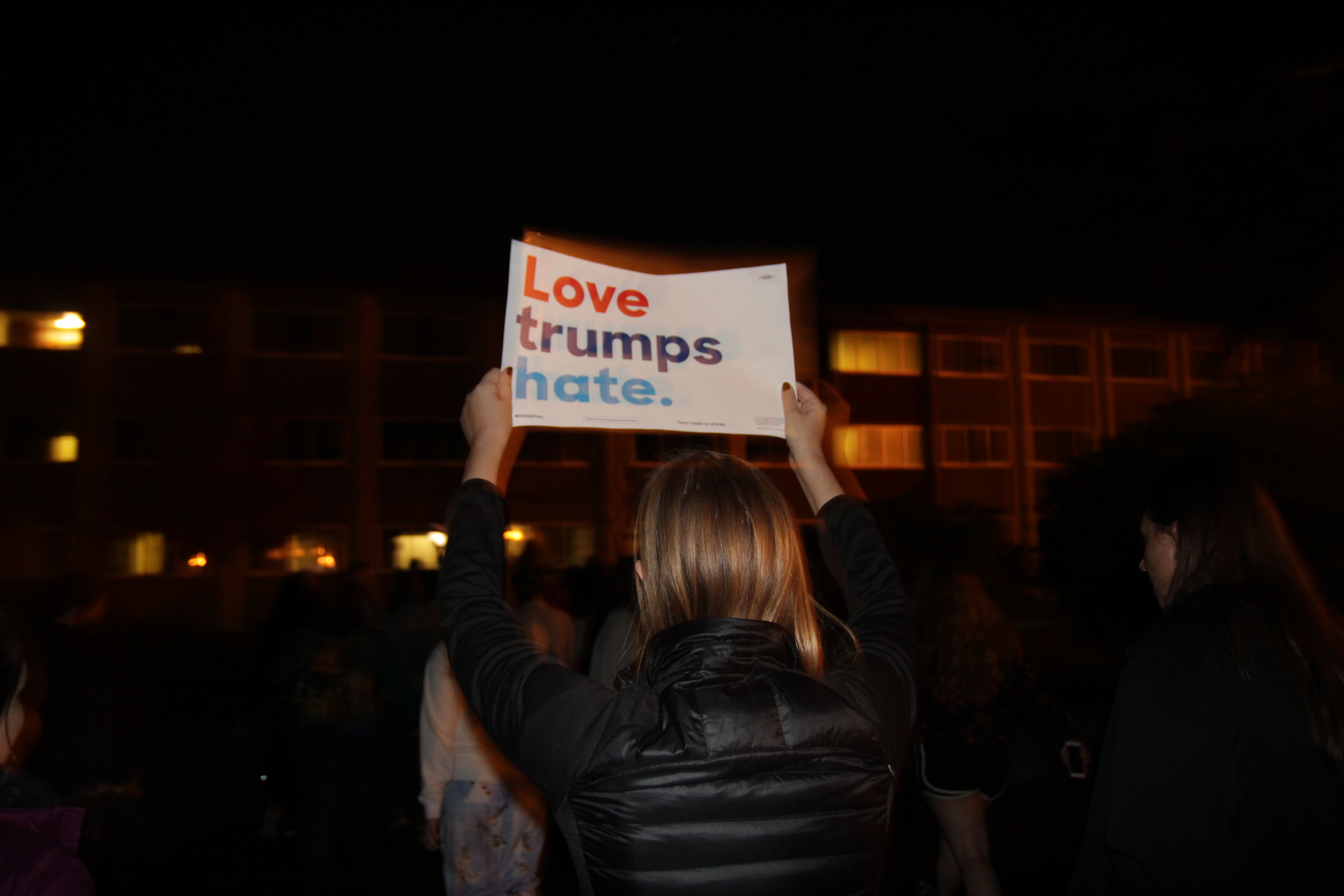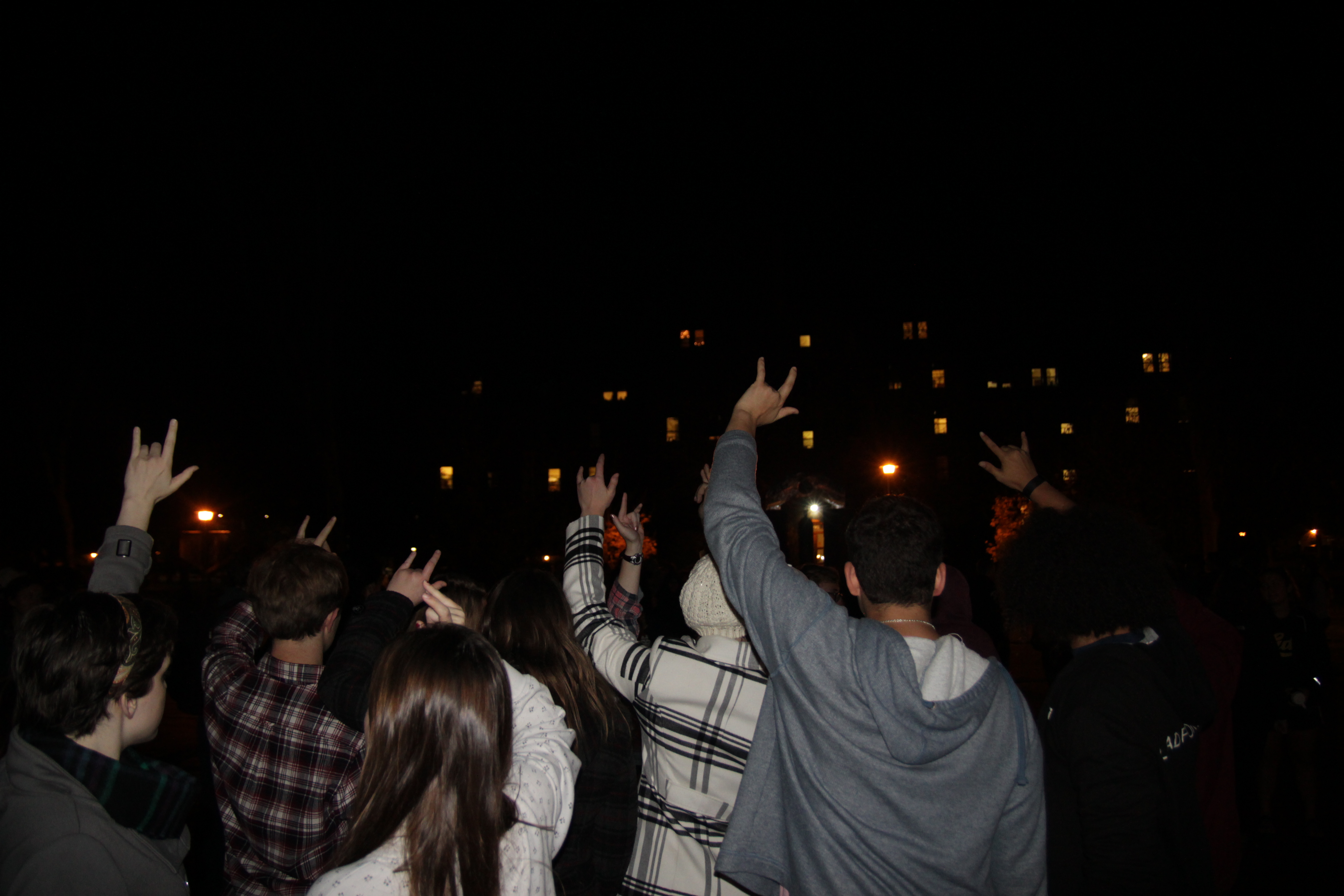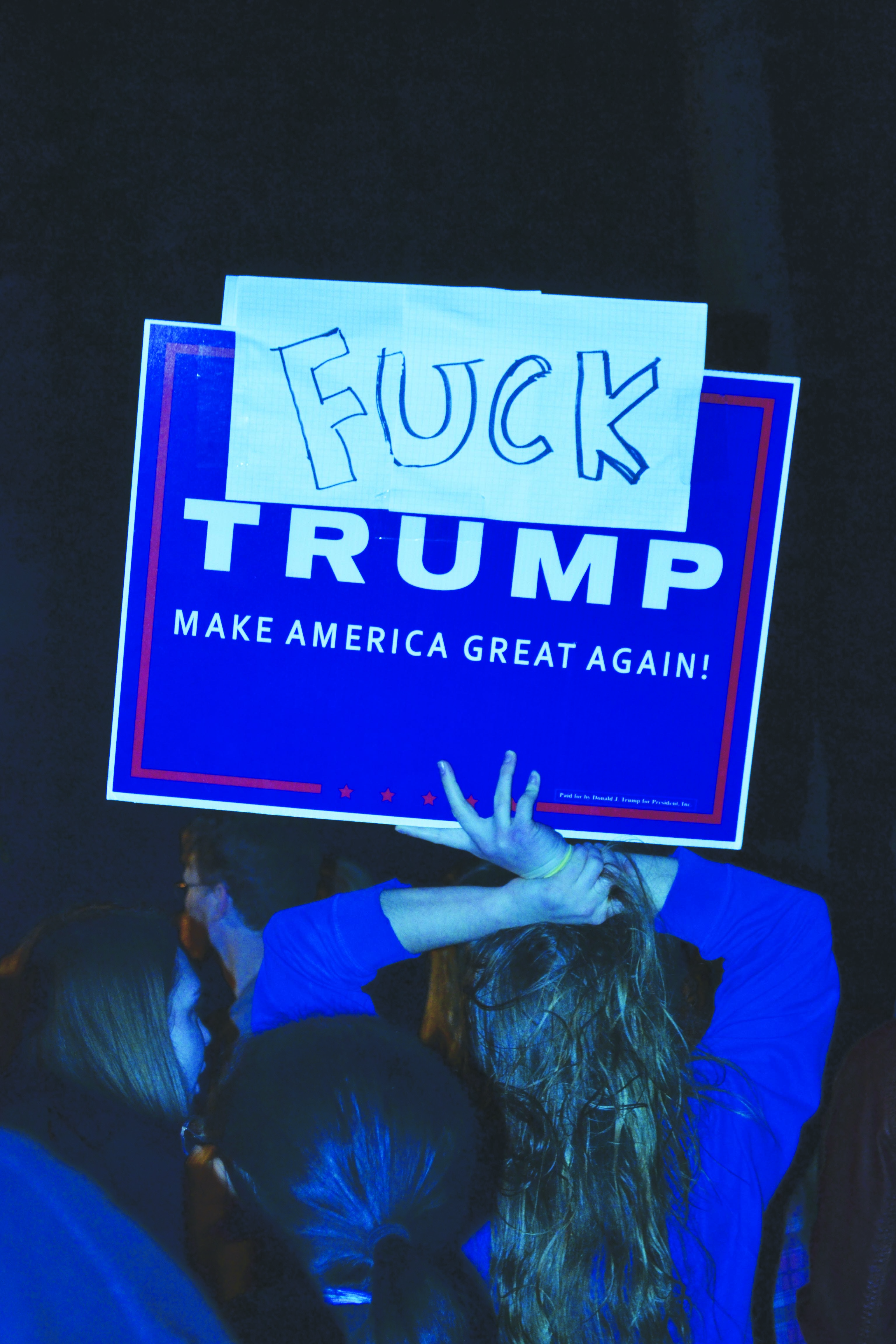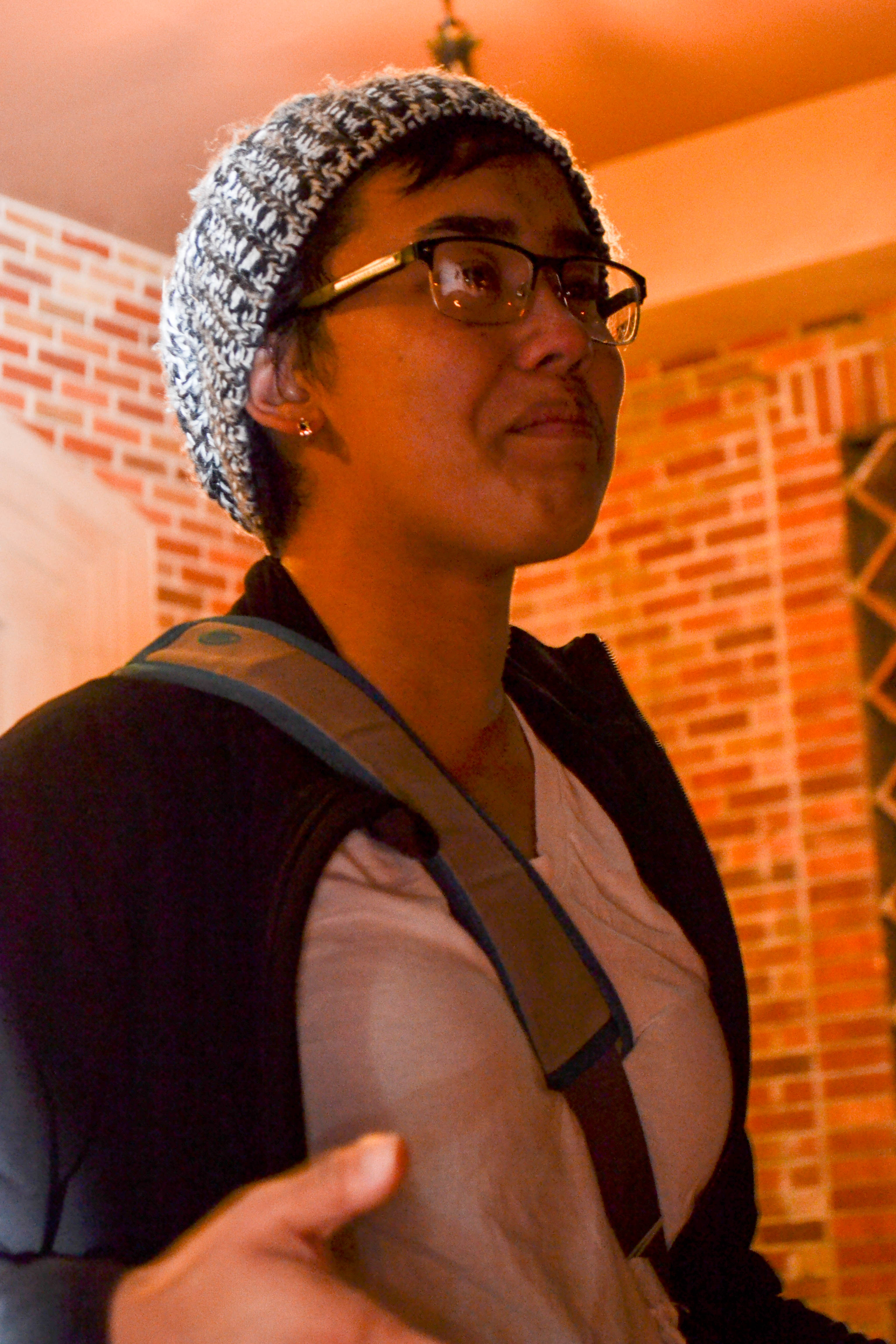Editor’s note: We at Mast Media recognize the pain, fear and suffering affecting members of the Pacific Lutheran University community following the 2016 presidential election. Throughout the reporting process, many sources have expressed concerns of safety regarding the publishing of their names and identities. Thus, The Mast includes only the names of people who have given us explicit permission. The Society of Professional Journalists Code of Ethics mandates reporters “show compassion for those who may be affected adversely by news coverage.” As Lutes invested in our community, we also feel responsible to protect and care for those who are vulnerable among us. To respect the requests of our sources, The Mast allows for anonymity in this article. However, as advocates for social justice and proponents of “thoughtful inquiry, service, leadership and care,” we encourage and support any student who comes forward in boldness to promote positive, powerful change.
The Mast uses the word “protest” to refer to the events of Tuesday night. This follows the model set by news outlets across the country, which use the term “protest” to describe public demonstrative acts. All synonyms for the word “protest” — such as “demonstration” and “rally” — also contain the term itself in their definitions.
MAST STAFF; mast@plu.edu
Donald Trump became U.S. President-elect Tuesday, Nov. 8. As news outlets projected his win, students across the U.S. took to their campuses to express their opinions and emotions. Pacific Lutheran University students organized an event to share their thoughts on the historic decision.
THE PROTEST
“I want us to begin with chanting, ‘Love not hate,’” junior Iana Mae Abinales said to approximately 50 students gathered in Red Square just after 10 p.m. Tuesday.
The student protesters marched toward Hong Hall chanting, “Love trumps hate.” They paused outside of Ordal Hall and chanted, “No justice, no peace.”

Protester carries “Love trumps hate” sign.
As the protest moved to lower campus, a few students standing near Pflueger and Tingelstad Halls began chanting “Go Trump” and “Do your homework.” These students declined to comment.
A few of these students were wearing clothing with PLU football logos. A few of them chanted “Save EMAL” in reference to the PLU football tradition Every Man A Lute.
The protest, which had grown to about 300 students, paused outside of the Anderson University Center on lower campus.
About 40 students voiced oppositional opinions such as “Vote Trump,” and approached members of the protest.
Sophomore Caitlin Johnston participated with the protesters. She said that the counter-protesters were “yelling things like ‘Know your facts’ and ‘Trump, Trump, Trump.’”
Other students participating in the protest responded to the counter-protesters by chanting “Build bridges, not walls.”
The protest moved through the Anderson University Center and reconvened in Red Square. The protesters walked towards the counter-protesters with their arms around each other. They made the American Sign Language sign for “I love you” with their hands.
In an email to Mast Media, sophomore Ben Cox said some people stood up and encouraged the protesters to spread love, not hate.
“I was standing next to two guys I had never met, but the three of us white males stood there with our arms over each others’ shoulders shouting at the top of our lungs surrounded by a crowd who wanted to show the world that no matter what happens, we would stand by what we believe,” Cox wrote.
The protest was organized from two posts on a then-public Facebook page titled “the collective.” The page belongs to a group of on-campus student activists.
The first post appeared at 9:34 p.m. and read: “We as the collective need to boycott or make a huge statement tomorrow if Donald Trump is about to be President… can we please do something about this?”
A post in response urged students to meet in Red Square at 10 p.m. Tuesday night.
“Bring a flashlight if you have one… so many are in need of light,” the post read. “Let us come together to drive out this awful, awful darkness.”

Protesters make the American Sign Language sign for “I love you” with their hands.
REACTIONS
A student who asked to remain anonymous for her personal safety shared her experience interacting with both groups of protesters.
“I became uncomfortable when one of the [protesters] made the comment that they were ‘blocking us with their white bodies,’ to which a white man in the larger group of protesters responded ‘fuck their white bodies,’” she wrote in a Facebook message to The Mast.
She said she felt those statements did not help progress toward understanding.
“It perpetuated the idea that the problem is white people, [but] the problem is ignorance and failure to discuss, learn, understand and connect — but none of these things can occur when both sides are rude,” she said.
Senior Adam Wilson, who was among the counter-protesters, said he voted for Trump but has “high respect for people who voted for Clinton.”

First-year Alena Haugel carries an edited Trump campaign sign.
“It feels like we should be getting together and trying to solve issues rather than just separating each other,” Wilson said. “It should be like talking about issues and trying to work as a country.”
Kate Hoyt, a Visiting Assistant Professor of Visual Communication, said protests like this let marginalized people know there others who are “willing to put put their bodies on the line to protect the safety of the most vulnerable among us.”
“There are students who woke up Wednesday morning fearing for their lives, and if those students feel just a little more heartened that our community is willing to stand up for their safety and well-being, then the impact of the protests will have been profound,” Hoyt said.
UNIVERSITY RESPONSE
Several sources, including Assistant Professor of Philosophy Sergia Hay — available here — have told Mast Media that students reported racially-insensitive behavior, including racial slurs and spitting tobacco over a student’s head.
Mast Media contacted Campus Safety; Eva Frey, Dean of Students; and Joanna Royce-Davis, Vice President for Student Life; and President Krise for comment.
Krise said there is no direct evidence that harassment occurred at the protest. Administration received information of harassment claims at the President’s council meeting Nov. 15, but Krise said “no one [seems to have] any direct experience of it.”
Frey said neither she nor Student Rights and Responsibilities had “received any formal reports of hate crimes or incidents related to protected classes” as of Nov. 14.
Campus Safety released their 60-day log, which did not have any related incidents. Ron Giddings, Assistant Director of PLU Campus Safety said they didn’t take action at the protest because it was a peaceful event.
“At this point, information hasn’t come forward that confirms hate speech was used,” Royce-Davis said.
PLU Football team captains Derek Chase and Juston Lind respond to certain team members’ actions at the protest in a letter to the editor available here.
The Office of the President, along with other groups on campus, hosted the Post-Election Campus Community Gathering Nov. 9. Read more about this story here.
Associated Students of PLU President Ellie Lapp and Vice President Taylor Bozich said in a shared statement emailed to Mast Media that ASPLU is supporting students post-election through creating “safe spaces to just ‘be’ and engage in dialogue,” as well as by hosting events focused on advocacy.
ASPLU will also host an implicit bias training Saturday, Nov. 19 that student leaders will attend, including members of the Mast Media Editorial Board, Residence Hall Association, Student-Athlete Advisory Committee and the Student Activity Board. The training intends to address “the whiteness of ASPLU and most of the student leadership in general.”
“It is important when advocating for all students that the leadership is truly representative of the student body, especially during times of political tension where students need to feel especially supported,” Lapp and Bozich wrote.
“[Students of Color at PLU] feel like they have never been supported by a large portion of the white community … so we don’t even really know what support looks like.”
Junior Vianey Cadenas
The ASPLU leaders said administrators’ responses to the protest — like the campus-wide meeting — “seem to be in line with what students need.”
Junior Vianey Cadenas, the president of Amigos Unidos at PLU, said the Post-Election Campus Community Gathering didn’t make her feel supported.
“They didn’t know what else to do,” Cadenas said. “They thought, ‘Oh this is quick and easy.’ But we didn’t find it genuine. [Students of color at PLU] feel like they have never been supported by a large portion of the white community, so we don’t even really know what support looks like if it was given to us because it has never been provided for us.”
EMOTION INTO ACTIVISM
“It’s important to recognize feelings like anger, fear and pain are not unproductive,” Lapp and Bozich said.
“Especially so soon after the election, catharsis is a necessary part of the process of advocacy. Over time, these feelings can be turned into advocacy work.”
Professor of History Beth Kraig said she has witnessed many PLU students and community members protest for justice and inclusion during her 27 years at PLU.

Junior Iana Mae Abinales
“No single protest is ever enough,” Kraig said. “I see the Collective and Tuesday’s protest as parts of a long historical process, one that requires each of us to keep working and build alliances and bridges.”
After the Post-Election Campus Community Gathering, President Krise told The Mast there were two extremes when approaching change. One “is to work within in the system,” to move an agenda forward quietly. The other is “something public” like a “demonstration or some sort of ad campaign.”
“The very loud, public thing can have the reaction of people not leaning forward to help solve the problem, [but] leaning back to resist the blast,” Krise said. “There are arguments for both.”
Kraig said, “Protests that only involve emotional expression may gain necessary attention.” She noted that protests “will fizzle if they do not direct that attention toward a clear list of goals.
“When a protest is linked to goals, and those goals are readily visible for all to review and debate, the protest is going to be much more effective and oriented toward long-term action and change.”
Hoyt advocated for spaces where students feel comfortable voicing their opinions are vital to social justice.
“The creation of environments that encourage expression and an exchange of ideas can oftentimes be just as important as changing the system itself,” Hoyt wrote.
Abinales said, “Take whatever anger or fear and transform it into something powerful.
“Whether it is working with coalition, a group, organization (even small ones on campus) or working on bettering yourself.”
Melannie Denise Cunningham, Director of Multicultural Outreach and Engagement in Campus Ministry, encouraged students to unite.
Cunningham said she “hopes that people are now aware to the depth of their soul…it’s going to take a united front” to achieve equity for racial minorities, women and LGBTQ individuals.
“This is the time for us all now to unite around that work and put our differences aside,” Cunningham said. “We are all human, and these things are affecting the human condition.”
Reporting was led by Rhiannon Berg. Matthew Salzano, Brooke Thames, Breanna Wiersma, Hannah Soltis and Jeff Dunn made significant contributions. Kiana Norman-Slack, Dylan Foreman, Libby Postovoit, Paris Franklin, McKenna Morin and Oliver Johnson also contributed reporting.

Students who have experienced harassment should report incidents to Student Rights and Responsibilities (srr@plu.edu) and/or BIRT (hambriaz@plu.edu). Students who wish to make their experiences with harassment public can contact the Mast at mast@plu.edu.
What is The Collective?
The Collective operates as an anonymous group of PLU community members who voice their concerns on how students of marginalized identities are treated on campus.
“We were born from a profound necessity for representation and activism on behalf of marginalized students and we are sustained by that demand,” The Collective wrote in a response to The Mast.
They submitted a list of demands to the Spring 2016 issue of The Matrix, PLU’s social justice magazine, which included adding required courses about race, hiring more faculty of color and implementing new training to help eliminate identity-based discrimination in the FYEP program. The entire document is available here.
“Our personal struggles are inexorably linked through the political system that govern our lives,” The Collective wrote in a written response. “Thus, we are committed to supporting those other peoples struggling for liberation and progress in our institutions and communities.”
Or personal struggles are inexorably linked through the political system that govern our lives.”
The Collective, in a written document for print
The group is publicly acknowledged and advocated for by President Krise. After the Post-Election Campus Community Gathering Nov. 9, he told The Mast he met with three members of the Collective earlier the same day.
“Everything The Collective is advocating for is completely encompassed by the mission statement,” Krise said. “How do we live out our mission statement in a fuller and complete way? That’s the question they’re asking.”
The group remains anonymous in attempt to spread power “laterally across the organization, rather than having a central power structure,” according to the group’s written response.
Beth Kraig said “there is merit in working to keep all voices at a similar level of strength and decision-making,” which is “to operate without a vertical structure that would… mistakenly give the impression that a few students are the sole spokespersons for an entire group.”
Melannie Denise Cunningham said she supports decisions that keep The Collective safe.
“If anonymity to the public is what [you] need to do to feel safe, then do it. Safety is a real concern,” Cunningham said. “As much as we would like to believe that our campus is harmonious in every way — and that we believe in the same values as far as protection for marginalized groups of people — the reality of the matter is that we are not.”
Mast Media has reached out to members of The Collective multiple times for comment on their group and its efforts, from September to the publishing of this article. The group has thus far denied face-to-face correspondence, but supplied a written document for print.
A Mast Media reporter requested permission to attend one of The Collective’s meetings Thursday, Nov. 10, held in an off-campus residence, in response to an invitation posted on the public Facebook page. She was denied permission to attend and report on the meeting. We continue to reach out to them.
The Collective’s public Facebook page was made private Thursday, Nov 11.


















